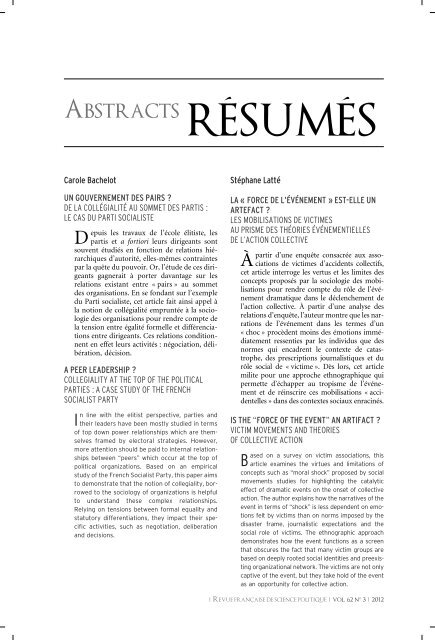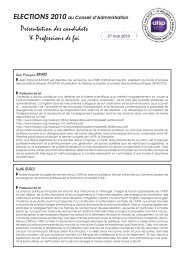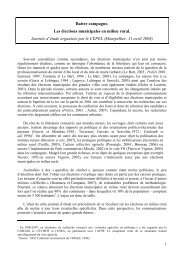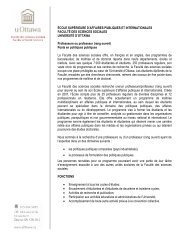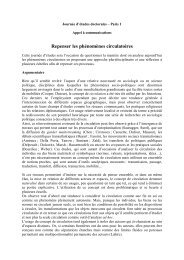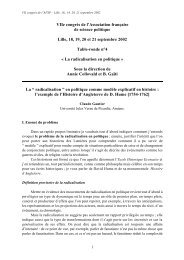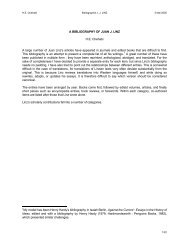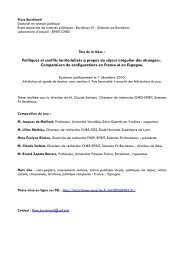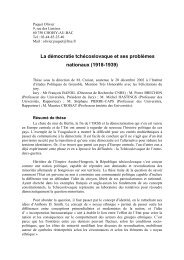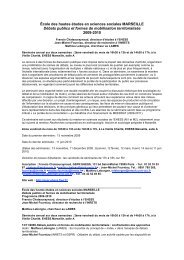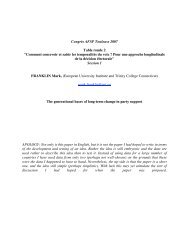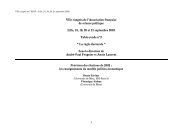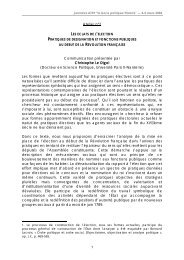Vol. 62 n°3 juin 2012 - Association française de science politique
Vol. 62 n°3 juin 2012 - Association française de science politique
Vol. 62 n°3 juin 2012 - Association française de science politique
Create successful ePaper yourself
Turn your PDF publications into a flip-book with our unique Google optimized e-Paper software.
ABSTRACTSRÉSUMÉSCarole BachelotUN GOUVERNEMENT DES PAIRS ?DE LA COLLÉGIALITÉ AU SOMMET DES PARTIS :LE CAS DU PARTI SOCIALISTEDepuis les travaux <strong>de</strong> l’école élitiste, lespartis et a fortiori leurs dirigeants sontsouvent étudiés en fonction <strong>de</strong> relations hiérarchiquesd’autorité, elles-mêmes contraintespar la quête du pouvoir. Or, l’étu<strong>de</strong> <strong>de</strong> ces dirigeantsgagnerait à porter davantage sur lesrelations existant entre « pairs » au sommet<strong>de</strong>s organisations. En se fondant sur l’exempledu Parti socialiste, cet article fait ainsi appel àla notion <strong>de</strong> collégialité empruntée à la sociologie<strong>de</strong>s organisations pour rendre compte <strong>de</strong>la tension entre égalité formelle et différenciationsentre dirigeants. Ces relations conditionnenten effet leurs activités : négociation, délibération,décision.A PEER LEADERSHIP ?COLLEGIALITY AT THE TOP OF THE POLITICALPARTIES : A CASE STUDY OF THE FRENCHSOCIALIST PARTYn line with the elitist perspective, parties andI their lea<strong>de</strong>rs have been mostly studied in termsof top down power relationships which are themselvesframed by electoral strategies. However,more attention should be paid to internal relationshipsbetween “peers” which occur at the top ofpolitical organizations. Based on an empiricalstudy of the French Socialist Party, this paper aimsto <strong>de</strong>monstrate that the notion of collegiality, borrowedto the sociology of organizations is helpfulto un<strong>de</strong>rstand these complex relationships.Relying on tensions between formal equality andstatutory differentiations, they impact their specificactivities, such as negotiation, <strong>de</strong>liberationand <strong>de</strong>cisions.Stéphane LattéLA « FORCE DE L’ÉVÉNEMENT » EST-ELLE UNARTEFACT ?LES MOBILISATIONS DE VICTIMESAU PRISME DES THÉORIES ÉVÉNEMENTIELLESDE L’ACTION COLLECTIVEÀpartir d’une enquête consacrée aux associations<strong>de</strong> victimes d’acci<strong>de</strong>nts collectifs,cet article interroge les vertus et les limites <strong>de</strong>sconcepts proposés par la sociologie <strong>de</strong>s mobilisationspourrendrecomptedurôle<strong>de</strong>l’événementdramatique dans le déclenchement <strong>de</strong>l’action collective. À partir d’une analyse <strong>de</strong>srelations d’enquête, l’auteur montre que les narrations<strong>de</strong> l’événement dans les termes d’un« choc » procè<strong>de</strong>nt moins <strong>de</strong>s émotions immédiatementressenties par les individus que <strong>de</strong>snormes qui encadrent le contexte <strong>de</strong> catastrophe,<strong>de</strong>s prescriptions journalistiques et durôle social <strong>de</strong> « victime ». Dès lors, cet articlemilite pour une approche ethnographique quipermette d’échapper au tropisme <strong>de</strong> l’événementet <strong>de</strong> réinscrire ces mobilisations « acci<strong>de</strong>ntelles» dans <strong>de</strong>s contextes sociaux enracinés.IS THE “FORCE OF THE EVENT” AN ARTIFACT ?VICTIM MOVEMENTS AND THEORIESOF COLLECTIVE ACTIONased on a survey on victim associations, thisB article examines the virtues and limitations ofconcepts such as “moral shock” proposed by socialmovements studies for highlighting the catalyticeffect of dramatic events on the onset of collectiveaction. The author explains how the narratives of theevent in terms of “shock” is less <strong>de</strong>pen<strong>de</strong>nt on emotionsfelt by victims than on norms imposed by thedisaster frame, journalistic expectations and thesocial role of victims. The ethnographic approach<strong>de</strong>monstrates how the event functions as a screenthat obscures the fact that many victim groups arebased on <strong>de</strong>eply rooted social i<strong>de</strong>ntities and preexistingorganizational network. The victims are not onlycaptive of the event, but they take hold of the eventas an opportunity for collective action.❘ REVUE FRANÇAISE DE SCIENCE POLITIQUE ❘ VOL. <strong>62</strong> N o 3 ❘ <strong>2012</strong>


